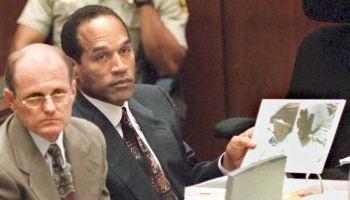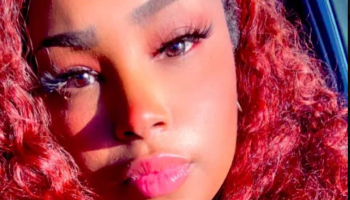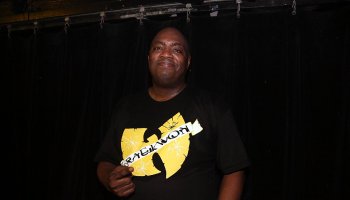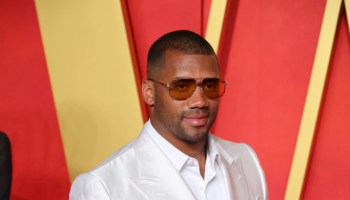I don’t remember my first haircut, but I do remember all of the times as a little boy when I was held down in a chair as a barber used clippers to shave off my thick, nappy, Black hair.
But it wouldn’t be until I had been radicalized by Black Studies courses during my undergraduate years and began political organizing around racial and sexual violence that I began to interrogate my own personally-held-politics about Black hair.
That inner-work, in many ways, was inspired and nurtured by Black feminists, womanists and queer folks who “thought it not robbery” as the church folks say, to teach me about protective hairstyles, different kinds of weaves, twist-outs, healthy hair products, and how to use those products—such as the difference between washing one’s hair every week or doing a co-wash to retain moisture and our hair’s natural oils.
In middle school, it was common for Black boys like me to ridicule each other about our hairlines or hairstyles. Dudes with locs always had a harder time than the guys with dark caesar cuts. And if you had waves, you were the shit. I wanted so badly to have waves that I used the widely known “Wave Builder” kit, but the only thing those chemicals did was overprocess my hair and make me look like Bobby Jones except with a shorter fade. It was awful. And yet, there I was, like the other guys, making fun of Black girls with weaves or humiliating those whose natural hair was in an Afro style. Retrospectively, I wonder what it would have meant for us, as Black boys, to think critically about Black hair alongside the ways we discussed and treated Black girls?
What is apparent in hindsight is that oftentimes our jokes landed on Black girls who were dark-skinned and we associated beauty with being lighter-skinned.
I wouldn’t have called this colorism until much later in life, but I’ll never forget what my mama shared with me one day after school, “I’m dark-skinned, and you better love dark-skinned Black girls.” My mother, too, had been a middle school girl and I’m sure that she knew what it was like to be on the other side of bad jokes, because some Black boys are socialized quite early to mistreat Black girls and women, even intergenerationally as Black men remain violently culpable.
Without question, the politics of Black hair are in many ways tied to colorism, sexism, anti-Blackness and misogynoir. But here I’d like to argue that they are also deeply tied to cisheterosexism and heteronormative gender policing. This point became increasingly clear last week amidst the failings of a major natural hair product company’s new multiracial, anti-Black, white-centered, light-favoring campaign. Many assumed that only Black women-identified folks were impacted by the natural hair company’s ad, and ignored a wide range of Black, natural hair wearing people across gender identities whose coarse coils benefitted from the brand’s products.
To be clear, we know that many natural hair companies are initially marketed toward Black cisgender women and as such these companies grow into prominent corporations because of Black women’s purchasing power and financial support.
However, natural hair and body product companies also profit from Black persons of multiple gender identities and experiences. Indeed, wearing natural hair, for many Black people including but not limited to Black women, is not only a political choice, but is also ecologically-driven and is a form of resistance to the prison of rigid, cisheteronormative gender performance.
Personally, I choose natural hair and body wash products because I am concerned about the environment, as much as I am troubled by the ridiculous ways that beauty, body, and hair products are gendered and marketed.
Deodorants, soaps, shaving creams, and hair products are often covered with images—controlling and confining—which privileged White and lighter skinned people, masculine men, feminine women, and blonde, straight, and stringy hair textures. Natural hair and body product lines allow me to shower knowing that I am not actively contributing to the degradation of our planet or the propagation of malevolent, racist, misogynoristic, and cisheterosexist ideals guised as market consumerism and beautification.
Yet I do not wish to frame this piece as a way of inserting Black men and other non-women-identified persons into the discourse mainly engineered by Black cisgender women about the natural hair movement and the politics of Black women’s hair.
Instead, it is my hope that this meditation opens up space for us to image what could happen if Black non-women-identified folks were incorporated into conversations about natural hair and body products. What would happen if Black men, for instance, were encouraged to interrogate our own hairstyle choices? In a piece at Abernathy online magazine for Black men, Vann R. Newkirk II writes about his natural hair journey. “in growing to love my hair, I grew to love and understand [my wife] more.”
I think a politics of love, as Newkirk writes, certainly emerges alongside more nuanced conversations about the politics of Black hair. I also think “un-gendering Black hair” and allowing space for those who are queer, gender nonconforming, and transgender to also voice our their disdain for white-centric beauty standards will also foster Black communal liberation that centers, embraces, and loves those of us deemed too ugly, too fat, too Black, too queer, too natural, too hairy, too monstrous, too feminine to be men and too masculine to be women, too this and too that.
I also think such un-gendering frees us from performing tired gender roles and politics that re-inscribe master class fascinations and disdain with our Black hair and flesh.
Ahmad Greene-Hayes is a doctoral student in the Departments of Religion and African American Studies at Princeton University. He also currently serves as an inaugural cohort fellow of the Just Beginnings Collaborative (2016-2018), where his project, Children of Combahee works to eradicate child sexual abuse in Black churches. Follow him @_BrothaG.
SEE ALSO:
Black Women & Girls Under Siege: Will Black Men Join Fight Against Rape, Abuse?
Black Lives Matter V. Trump: What’s Next?
Colorism, Sexism, Racism & The Politics Of Black Hair was originally published on newsone.com











